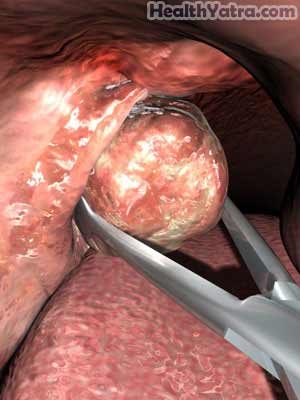Definition
The tonsils are glands in the back of the throat. A tonsillectomy is the surgical removal of the tonsils.
Reasons for Procedure
Tonsillectomy is most often done when other nonsurgical treatments have not worked for:
- Chronic or recurrent tonsil infections—Tonsillectomy may reduce the number, but will not completely eliminate, these infections.
- Peritonsillar abscess (pocket of infection spreading outside the tonsil)
- Enlarged tonsils causing obstruction of the throat

Possible Complications
Complications are rare, but no procedure is completely free of risk. If you are planning to have a tonsillectomy, your doctor will review a list of possible complications, which may include:
- Bleeding
- Temporary breathing problems
- Adverse reaction to anesthesia
- Vomiting and dehydration
- Infection
Factors that may increase the risk of complications include:
- Obesity
- Smoking
- Poor nutrition
- Chronic illness
- Sickle cell anemia
- Bleeding disorders
- Recent or current steroid use
- Diabetes
- Intake of anticoagulants or aspirin products
- Dehydration
Be sure to discuss these risks with your doctor before your tonsillectomy.
What to Expect
Prior to Procedure
Your doctor may:
- Do a physical exam of the tonsils, throat, neck, and possibly other parts of the body
- Order blood tests and perhaps a urine test
- Review your medical history and current medicines
Leading up to your procedure:
- Talk to your doctor about your current medicines. Certain medicines may need to be stopped before the procedure such as:
- Aspirin or other anti-inflammatory drugs for up to one week before surgery
- Blood-thinning drugs such as clopidogrel (Plavix) or warfarin (Coumadin)
- The night before, eat a light meal. Do not eat or drink anything after midnight.
Anesthesia
General anesthesia is most commonly used. You will be asleep for the procedure. If necessary, the surgery can also be done with sedation and local anesthesia.
Description of the Procedure
The anesthesia will be given through an IV or by a mask. The doctor will grasp each tonsil with a special tool. The tonsils will then be cut away from the surrounding tissues and removed. The tonsils may be cut out with a scalpel or hot knife. An electrical current or clamps and ties will be used to stop bleeding at the site.

How Long Will It Take?
About 20-60 minutes
Will It Hurt?
Anesthesia prevents pain during the procedure. After the procedure, you will find it difficult to swallow due to throat pain. You may also experience ear pain.
Your doctor will either give you pain medicine or recommend over-the-counter products to relieve pain.
Average Hospital Stay
This procedure is most often done in a hospital setting. It may be possible to leave the hospital on the day of the procedure. Some patients may need to stay in the hospital for up to two days. Talk to your doctor about what is right for you.
Post-procedure Care
At the Hospital
- You will be monitored for any negative reactions to anesthesia or other complications.
- Once you are fully awake, alert, and stable, you may be able to leave. An adult should accompany you and drive you home.
At Home
When you return home, take the following steps to help ensure a smooth recovery:
- Be sure to follow your doctor’s instructions.
- Take medicines that are prescribed as directed.
- Avoid talking, coughing, and singing for one week.
- Drink plenty of fluids.
- Avoid spicy, acidic, and hard-to-digest foods.
- Eat soft foods, such as gelatin and pudding, for 3-4 days after surgery. Gradually return to a normal diet.
- Avoid swallowing hard items such as crackers and hard cookies. They may injure the back of your throat.
- Bathe or shower as usual.
Call Your Doctor
After you leave the hospital, contact your doctor if any of the following occur:
- Signs of infection, including fever and chills
- Redness, swelling, increasing pain, excessive bleeding, or discharge from the site where the tonsils were removed
- Nausea and/or vomiting that you cannot control with the medicines you were given after surgery, or which persist for more than two days after discharge from the hospital
- Pain that you cannot control with the medicines you have been given, especially if it prevents you from drinking water
- Cough, shortness of breath, or chest pain
- Spitting or vomiting blood
- New, unexplained symptoms
In case of an emergency, call for medical help right away.
